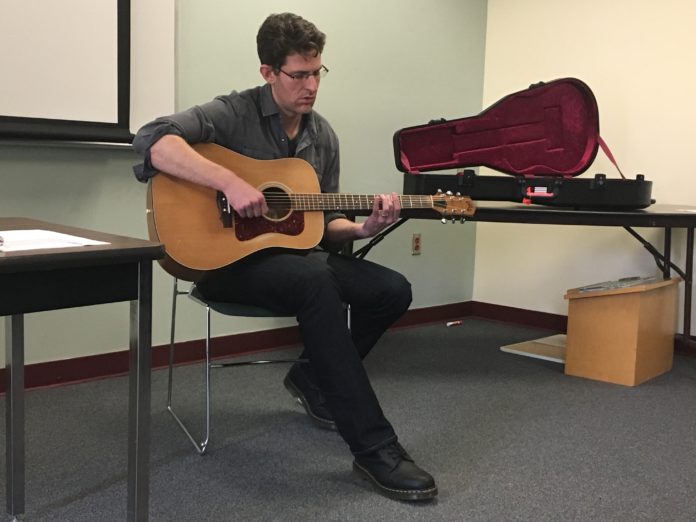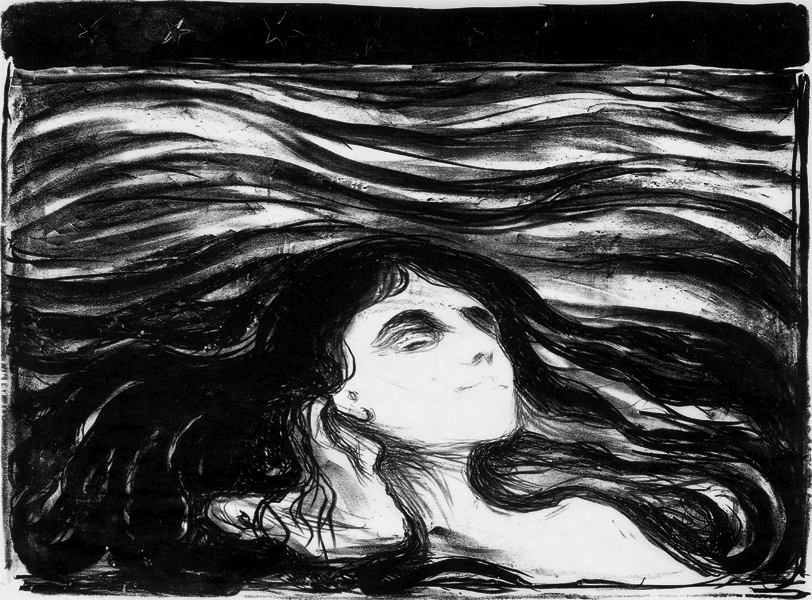PARIS FRANKLN; Culture Editor; franklpm@plu.edu
While Homer’s “Odyssey” has persisted as a classic work and is still widely read today, few have the opportunity to experience The Odyssey as it was originally intended: an oral performance.
On April 10, students at Pacific Lutheran University filled Xavier 201 for a performance by modern day bard Joe Goodkin.
“It really just takes an acoustic guitar and a room, and maybe a little bit of magic with a projector,” said Goodkin, who projects his lyrics onto a screen behind him when possible. “It’s meant to be done in anything from living rooms to classrooms to amphitheaters to auditoriums to outside.”
The event was organized by PLU’s Classics Program (within the Languages and Literatures Department), with support from the English and Religion Departments and the student-run Anthropology Club. The performance was made possible by The Innovative Teaching Grant through the Office of the Provost.
While the stories of The Odyssey were originally thought to have taken over a week to share with an audience, Goodkin has adapted his performance to include all 24 books in just 30 minutes.
However, this condensed version still reflects the story in depth, according to Visiting Assistant Professor of Classics Eric Thienes, the event’s main organizer. “There are recognizable elements of every book in his song,” Thienes said.
Goodkin also uses a guitar, instead of the traditional lyre or kithara, as one way to connect with modern audiences. “He’s adapting it for a 21st century audience and I think the guitar bridges that gap,” said Thienes. “It has elements of that ancient sound,” Thienes added, “but it’s also a familiar sound that students can connect with. We’re familiar with it; we listen to it in all of our songs.”
These modernizations allow students to connect with the classic work more easily. Thienes said that much of the story’s power came from its universal themes. “In some ways, it is a coming of age story,” said Thienes, “a tale of maturation and learning about the world. Everyone is on a journey, whether on an academic or personal level.”
In previous years at PLU, the mythology course focused on the theoretical approaches to studying mythology. This approach has been used by professors of mythology for quite some time, but Thienes has an even more distinctive perspective on how to best teach about Ancient Epic poems such as The Odyssey. Events like Goodkin’s performance are exactly what makes the class so unique for students.
Including elements of oral tradition to the course is of Thienes’ own conception, and it is highly influenced by the work of one of his mentors from graduate school, John Miles Foley, an expert on oral tradition. Rather than spending time studying the stories themselves, students of Thienes can expect exposure to the context in which epic poetry was performed.
Thienes also said he believes that Goodkin’s performance gave students a glimpse into the performative aspects of ancient poetry.
“We can’t detect them just by reading a text,” said Thienes. “The pauses, the space between words, is lost in something.” He said he believes that observing elements of performance helps students understand the work itself.
This connects to Goodkin’s main motivation for performing as a bard: participating in something that has been performed for thousands of years. “Some of the trappings of it have changed, but it’s really the exact same procedure,” said Goodkin. “It gets the same meaning, the same human experience, and I think that is really moving and poignant.”
Goodkin’s favorite aspect of being a bard is participating in something that has been performed for thousands of years. “Some of the trappings of it have changed, but it’s really the exact same procedure,” said Goodkin. “It gets the same meaning, the same human experience, and I think that is really moving and poignant.”
Goodkin emphasized the importance of the discussion with the audience following each performance in developing how he portrays the classic work. “The audience and I create the meaning together in the discussion after the show, and it changes every time,” said Goodkin. “They challenge me to either validate or develop what I’ve sung, so I see the discussion as not an extension of the performance, but the performance.”
Despite performing the same material for over 200 colleges and universities in 33 states, Goodkin still finds meaning in Homer’s text.
“I decided to just go ahead and do this until it stopped giving me new material intellectually and emotionally, and it hasn’t yet,” said Goodkin. “If I ever run out of steam, I might consider doing other books or other myths, but I also think I picked the story that is the most uniquely right for what I do and for me.”
Hear it for Yourself
To hear the entirety of Goodkin’s Odyssey, check out YouTube, Spotify, or Joe Goodkin’s website at http://joesodyssey.com/.


















